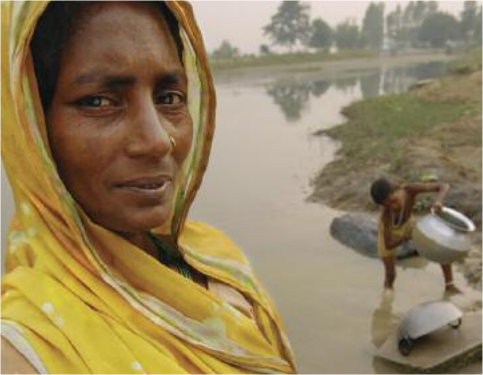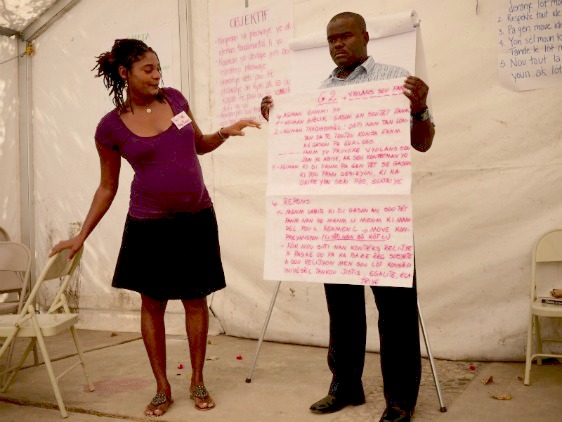Transparency & Accountability


Transparency refers to the right of citizens to access relevant information. Openness and public access to information are vital, so that water-users can understand the decision-making processes that affect them. This makes citizens knowledgeable about the standards to expect from public officials and enables them to protect their rights.
Accountability is a broad concept that entails several dimensions and is often used in different ways. Some see it as a mechanism to hold people and institutions accountable, whereas others may see it as a concept referring to the actual application and implementation of rules and standards. Accountability in a democratic sense means that an individual in a public function or a public institution must answer for their own actions. This includes political, administrative, and financial dimensions.
Why Does Corruption Matter?
It is estimated that corruption in developing countries raises the price of connecting a household to a water network by up to 30 percent. In many countries almost half the water supply is lost to unmonitored leakages and illegal connections. Investing in good water governance means investing in jobs, agriculture, health, education and environmental protection. It’s a straightforward path to progress; yet, too often that path is blocked by corruption.
Water Corruption: Many Forms, One Effect
Water corruption comes in many shapes. It can involve collusion or bribes over contracts, officials turning a blind eye or enjoying personal or political gain, or people having to pay illegal fees to water companies for connection to a water supply. Whatever the form, the effects of corruption are ultimately the same: higher costs and reduced access to water hit poor people the hardest.
- Corruption prevents Nairobi’s water from reaching millions of Kenya’s poor people, forcing them to pay 5 to 10 times more for water from other sources.
- In California, San Diego households were overcharged for sewage treatment services and the excess was unlawfully used to subsidise industrial customers.
- Local corruption in China often prevents enforcement of environmental regulations, meaning 700 million people drink water contaminated with animal and human waste. Estimates suggest poor quality water causes 60,000 premature deaths annually.
- Several European and North American multinational companies were prosecuted for bribery for the US $8 billion Lesotho Highlands water infrastructure project.
The Water Integrity Network approach to Corruption
WIN takes a dual approach to tackling water sector corruption; combining global advocacy and local action. It brings together partners and members from the public and private sectors, civil society and academia, to drive change that will improve the lives of people who need it most.
Global Advocacy: by placing water corruption firmly on the international agenda, WIN is raising levels of integrity and accountability across the sector. WIN is also working closely with its partners and global decision-makers to advocate for the changes and transparency needed to contain corruption.
Local action: WIN also initiates and supports campaigns to translate global advocacy into local and national action. Through grants to civil society organisations, it encourages integrity in local governance. It also creates country action programmes, assessing corruption levels and offering potential remedies.
Help us shape a clean-water future: WIN’s membership gives it a global reach based on locally driven initiatives. Members and partners form national coalitions assessing water integrity and advocate with governments for regulation to prevent water corruption. Membership is open to both individuals and organisations. One needn’t be a water expert: members can learn how to detect and prevent corruption, follow the latest developments, and share experiences with other members and WIN partners at waterintegritynetwork.net.
The IRC programme for Transparency & Accountability
International Water and Sanitation Centre (IRC) has a programme that supports improved transparency and accountability to reduce sector corruption through activities including advocacy, action research, dissemination of publications, events and training and advice.
- Developing a water anti-corruption strategy in Mozambique: The IRC International Water and Sanitation Centre are supporting Cowater Consultores Lda. to develop an appropriate anti-corruption strategy and plan with the Direcção Nacional de Águas (DNA) in Mozambique.
- IRC signs up to the INGO accountability charter: IRC has signed up to the INGO accountability charter, an action intended to help strengthen the accountability of our organisation.
- Training manual on water integrity: IRC was one of the WIN members which contributed to a new training manual on water integrity published by SIWI, WIN, CapNet and WATERnet. IRC's Alana Potter was contracted to design the learning process and finalise the text. Many of the materials and exercises were tested during IRCs preventing corruption training. We envisage using this excellent guide in future training courses.
- IRC experience on transparency and accountability: Summary information on IRC activities, information products and expertise in WASH sector transparency and accountability issues.
- Publications: A selection of available publications on transparency, accountability and integrity in the water and sanitation sector from IRC and partner organisations.
- Training and advice: IRC runs a regular 3-day training workshop (in the Netherlands) on preventing corruption in water, as well as being involved in other training activities and providing advisory support to partners and clients.
- News: News items on corruption issues and measures to promote transparency, accountability and integrity in the water sector from IRC's newsletter Source Weekly.
- Events: Forthcoming events (and resources from past events) on transparency, accountability and integrity organised and involving IRC
- Resources: Internet resources on transparency, honesty and corruption for the water and sanitation sector.
An Introduction to Preventing Corruption
Below, this 37-slide presentation gives advice on how to identify and prevent WASH project corruption.
It favors strategies that help the poor and covers the following topics:
| - Governance, poverty and WASH indicators in 10 countries - Correlation or cause? |
- Decentralization versus centralization in India - Report cards in India |
- Pro-poor, anti-corruption strategies - Diagnose |
Links
- Intervision Role Play. IRC. A summary of the role play exercise that is highly suitable and informative for analysing problems, like a lack of transparency and corruption in water and sanitation, within small groups.